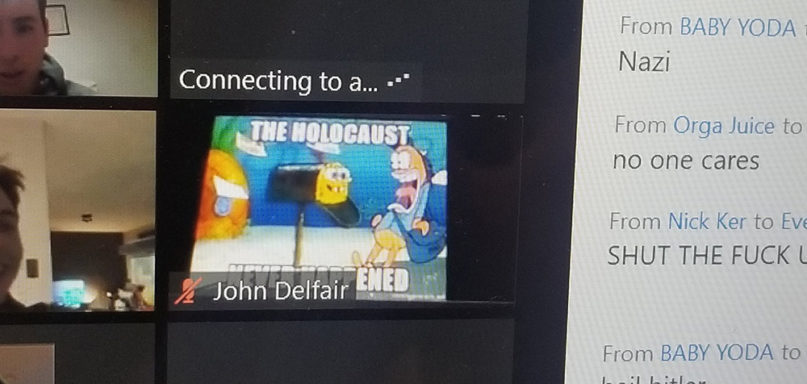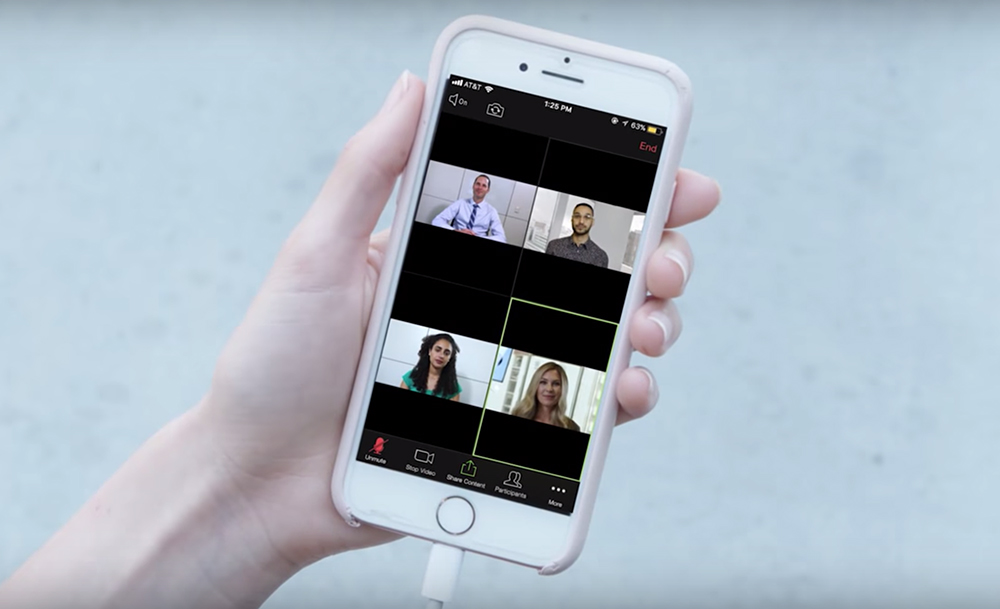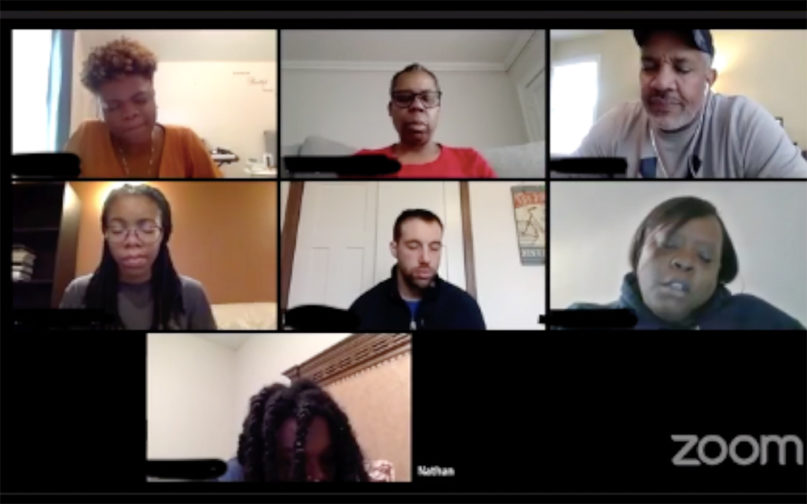(RNS) — With their eyes closed in prayer, asking God to help the country’s overburdened healthcare workers, members of the Impact Movement ministry group never saw the attack coming.
“God is dead, God is dead,” they suddenly heard a young male voice say over their Zoom video conference system. Then other voices joined in, laughing and chanting: “N****r, n****r, n****r.”
When members of the national black Christian campus ministry group opened their eyes at the unexpected voices and words, the screen was showing first-person footage of a gunman spraying worshippers with bullets at a New Zealand mosque.
“They were snickering, they started drawing red marks for blood,” recalled Jimmy McGee, head of the Impact Movement, who was leading the meeting. “Then they started calling out by our names. By that time we realized we couldn’t control the Zoom call. So we abandoned the meeting. When we got on our next call, they hacked right back in and started playing pornographic pictures.”
After their virtual prayer session was hijacked by the group of 16 trolls, Impact Movement’s leaders say they won’t stop using Zoom, though they have stopped publicizing links to the meetings and are now using the app’s waiting room feature to protect it from strangers joining in.
But they are also calling for law enforcement and Zoom to crack down on perpetrators of racial abuse on the platform.
The incident is part of a growing trend, dubbed ‘Zoombombing,’ in which online trolls exploit the sudden reliance of schools, houses of worship and other faith groups on digital meeting platforms such as Zoom, often disrupting meetings with graphic, hateful and threatening images and language.
But the issue goes beyond bored trolls randomly scrolling through Zoom meeting IDs. Minorities, particularly black and Jewish groups, have been targeted with coordinated networks of trolls forcing unwitting worshippers to view racist and anti-Semitic language.
RELATED: ‘Zoombombing’ comes for houses of worship
“To me, this is very intentional,” said McGee. “They’re deciding to concentrate on certain places. Either they see us as vulnerable, or they want to attack our population. Or both.”
Late last month, someone sent images of lynchings and pornography during a church service held on Zoom by the St. Paul AME Zion Church in Ewing, New Jersey. Led by the Rev. Keith Tillett, the mostly black church has posted Zoom links to its virtual worship services and Bible study groups on social media. And it has continued to do so after the harassment.
“The devil is busy and with everything online now, he has a new playground,” the church’s leaders wrote afterward in a post on their Facebook page informing members about how to protect themselves against Zoombombing. The national African Methodist Episcopal Church has sent a directive to all members urging them to make Zoom meetings private, limit screen sharing and avoid sharing links to the meetings publicly.
At Boston’s First Baptist Church in Jamaica Plain, the Rev. Laura Everett’s Sunday sermon over Zoom was interrupted by trolls who began forcing racist and anti-LGBT hate speech onto participants’ screens. The church is LGBT-affirming; Everett is in a same-sex marriage.
“The online ‘doors’ of the church were rightly open, and folk who have nothing better to do than come shout racist and anti-LGBT slurs to people trying to follow Jesus decided to enter,” Everett told Religion News Service previously. “Zoom is selling a product in their online platform and so has a responsibility to their users to ensure safeguards for our gatherings. Zoom needs to do better, as we’ve seen these attacks on worshippers escalate.”

A screengrab from a Zoombombed online class at Yeshiva University. Image via @Elazarta/Twitter
Online classes at Yeshiva University were Zoombombed this week by anti-Semites posting Holocaust denial memes and comments saying “Heil Hitler” and threatening to gas participants. Services livestreamed by a London synagogue were disrupted by close to 40 accounts who began posting a slew of abusive comments. Online Shabbat services have been interrupted by neo-Nazis, as well.
Torah scholar Rabbi Asher Weiss was teaching an online Torah lesson via Zoom last month when some participants suddenly changed their virtual backgrounds to show the n-word and an image of “Mein Kampf.” Then participants began shouting, “Hitler did nothing wrong” and “Heil Hitler.”
RELATED: Click here for complete coverage of COVID-19 on RNS
During a seminar on anti-Semitism hosted by a Massachusetts Jewish student group on March 24, someone showed off the swastika tattooed on his chest. The Anti-Defamation League’s Center on Extremism says the perpetrator was likely white supremacist and convicted hacker Andrew Alan Escher Auernheimer, known online as “weev.”
Auernheimer has taken credit in the past for sending anti-Semitic fliers to thousands of printers at colleges around the U.S. and participated in a Twitter harassment campaign against Jewish journalists.
After two Zoombombing incidents at Massachusetts schools, including the one that the ADL believes likely involved Auernheimer, the FBI field office in Boston issued a statement recommending anyone using video-teleconferencing technology exercise “due diligence and caution” to mitigate teleconference “hijacking threats.”
Officials urged victims of such hijacking to file complaints with the FBI’s Internet Crime Complaint Center and separately report any specific threats made during the harassment.
“While some of these reported Zoombombing incidents can be attributed to internet trolls without particularly malicious intentions, there is concern that extremists could exploit the increasing reliance on video conferencing technology to target certain groups or advance their hateful messages,” the ADL wrote in a blog post. “…While, to date, there has been limited online chatter among extremists about the specific strategy of abusing video conferencing technology, Auernheimer’s recent actions in Massachusetts demonstrate the potential for extremists to exploit these systems.”
The attacks may be virtual, but their effects can be very real.

The Zoom app has recently been adopted by many houses of worship for video conferencing and streaming worship services. Video screengrab
“Our country’s history and recent past don’t really leave room for us to take such actions lightly, to disregard them as teenagers playing around,” said Impact Movement board chair Marla Frederick, a professor of religion and culture at Emory University. She pointed out that the harassers could see the participants’ names and faces.
“Teenagers shoot up schools, too. We have to take every threat, every act of aggression, violence, intimidation seriously. … You just don’t know when things will escalate, which is why law enforcement should be obligated to investigate,” she said.
After their Zoombombing experience, Impact Movement’s leaders brought in a trauma expert to work through their emotions in a meeting the next week.
“Our staff and students had never been the direct object of such toxic hate,” McGee said. “Some of our members began to weep and cry. There was a lot of anxiety, and it just shook them throughout the weekend. Maybe we were naive to think that during COVID-19 people wouldn’t engage in such cruel behavior.”
Zoom itself has struggled to grapple with security flaws since the company became the world’s top solution for remote meetings, classes and even religious services during the pandemic.
In a blog post this week, Zoom’s CEO, Eric Yuan, apologized to users for “falling short” on safety, privacy and security issues.
“We now have a much broader set of users who are utilizing our product in a myriad of unexpected ways, presenting us with challenges we did not anticipate when the platform was conceived,” Yuan wrote, promising to shift all engineering resources to address safety and privacy concerns for the next three months. “These new, mostly consumer use cases have helped us uncover unforeseen issues with our platform.”
To prevent Zoombombings, the company has also published a guide that encourages meeting hosts to use its safety features, including its waiting rooms and passwords, and to limit on-screen sharing and annotations. Users can also report incidents that involve harassment, threats or indecency to Zoom support.





